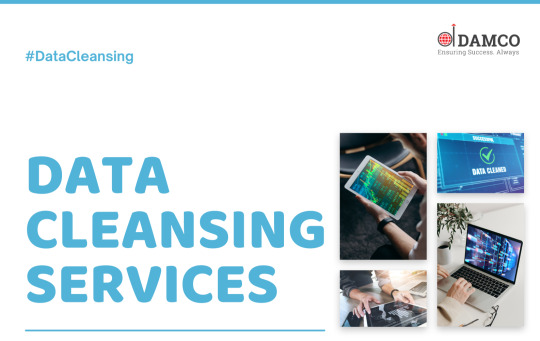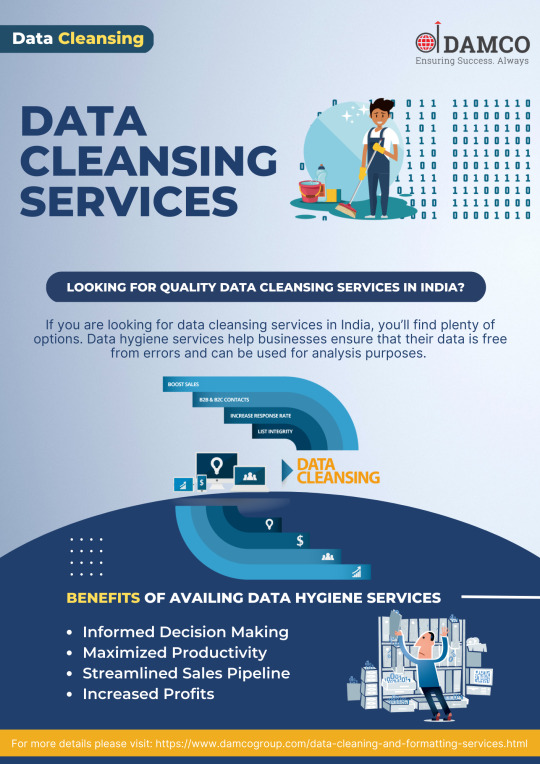#B2B data cleansing services
Explore tagged Tumblr posts
Text
Enhance your sales pipeline and increase your Marketing ROI by leveraging effective CRM data cleansing services. Regularly updating and cleaning your CRM data ensures accurate information, leading to better customer insights and improved decision-making. It helps in identifying potential leads, reducing errors, and increasing overall efficiency. Invest in CRM data cleansing to maintain a competitive edge and drive business growth. A human writer emphasizes the importance of data accuracy for business success.
#data cleansing services#crm data cleansing services#data cleansing#outsource data cleansing services#b2b data cleansing services
0 notes
Text
Revitalize Your Business: Exceptional B2B Data Cleansing Solutions Unleashed
Avail of B2B data cleansing services from Damco and get verified and correct databases at your easy disposal. Hence, you can also increase productivity and get incremental ROI. Elevate your business's data integrity with our top-notch B2B Data Cleansing Services. Experience streamlined operations and enhanced decision-making. Unlock the potential of clean, accurate, and reliable data today.

0 notes
Text
Explore proven strategies for improving data quality through effective data cleansing techniques. Enhance decision-making, streamline operations, and gain a competitive edge in the digital age. Delve into insightful blogs on optimizing data quality, discover practical tips, industry best practices, and innovative approaches to elevate your data management processes. Empower your business with reliable insights and stay ahead of the curve with our expert guidance.
0 notes
Text
📣 Maintain Data Hygiene With Professional Data Cleansing Services
🎤 Keeping a check on data quality and hygiene is essential for informed decision-making. Outsourcing data cleansing services helps you eliminate errors including incomplete entries, incorrect information, duplicate records, etc., without impacting its integrity.
🔔 Leverage data hygiene services offered by Damco Solutions to detect and remove erroneous data, promoting data accuracy and standardization within your database.

0 notes
Text
youtube
High-quality data is important for businesses, whether big or small, old or new, B2B or B2C. It ensures accurate outcomes of quantitative research, greater success at AI initiatives, superior customer experience, optimized operational processes, trusted reporting and analytics, and a greater ROI
Tips to Create an Effective DQ Strategy:
Define business needs and measure impact Know your data Address DQ issues at the roots Leverage normalization tools and techniques Leverage data governance Get a data steward Innovate with DataOps Focus on regular training Avoid future data errors
Read here the inspired blog: https://www.damcogroup.com/blogs/strategies-for-improving-data-quality-through-data-cleansing
0 notes
Text
Strategies for Improving Data Quality Through Data Cleansing Services

After all, high DQ ensures accurate outcomes of quantitative research, trusted reporting and analytics, greater success at AI initiatives, optimized operational processes, superior customer experience, and an even higher ROI. The best start to the DQ improvement process is by developing an organization-wide strategy that onboards everyone in the company to work collectively towards building a culture that fosters quality data.
Tips to Create an Effective DQ Strategy
A data quality strategy is one that defines processes and systems to include DQ in all business activities to ascertain that only trusted data is used across the length and breadth of the organization. A result-oriented strategy apprehends business objectives, goals, processes, initiatives, and scope to enhance DQ along with integrity. Defining a DQ strategy enables businesses to identify, resolve, as well as prevent quality issues to build a stronger foundation of trusted data—and this is where B2B data cleansing services help.

Tip 1: Define Business Needs and Measure Impact
Well-defined business needs to drive DQ improvement initiatives. Begin with prioritizing issues based on the company’s needs and how these might impact your organization in the long run. This will help establish a realistic goal as well as keep a check on the progress of quality improvement initiatives. Further, continuous reference to the organizational needs provides the context for refining your approach to quality data.
Tip 2: Know your Data
Not all data is equal, meaning that not all pieces of information out there are relevant for your business; hence, the key here is to understand your data. This means that businesses not only need data that is ‘right’ for trusted users, but you also need the ‘right’ data to lay a stronger foundation. You should know your data correctly—what it contains, what is its source, how to extract value from it, etc., to determine if it is ‘right’ or relevant for your intended business use case.
After all, data intelligence is the ability to understand the data correctly and leverage it in the right way. Correctly describing and connecting the dots (here data) throughout its journey is an ideal approach to enhance DQ.
Tip 3: Address DQ Issues at the Roots
Data quality issues are often fixed temporarily so that the work isn’t impacted. For instance, what do data scientists do when they find incomplete entries in their selected datasets? They are most likely to fix those errors in their copy and proceed with their data processing and analysis. However, the original dataset still has those quality issues as the corrections do not reach the source, negatively impacting its subsequent use. As the adage goes, ‘prevention is better than cure,’ preventing dirty data from propagating is one way you can improve your DQ.
Take another example where a healthcare staff faced difficulties contacting patients after their visits. To deal with this, they decided to address this issue at the source when they discovered that the contact numbers were wrong for various patients. These patients were then asked to verify their phone numbers while checking in. As a result, this eliminated the quality issue in datasets quickly.
Tip 4: Leverage Normalization Tools and Techniques
Users sometimes make mistakes (incorrect spellings especially) while entering data in different forms. For example, they might write ‘treu’ for ‘true’ in a hurry and then forget about it. However, picking up such incorrect entries for analysis can seriously impact your DQ.
Hence, leveraging a defined list of values whenever possible leaves no room for users to make such types of mistakes. Besides, an experienced data formatting company leverages the right-fit normalization tools and techniques to rectify inconsistencies and errors and enhance the dataset quality.
Optimize Costs without Jeopardizing Growth via Data Cleansing Services
Deep Dive
Tip 5: Leverage Data Governance
Naturally, everyone within a data-driven organization needs to acknowledge their part in improving the quality of data. Develop a shared definition of high-quality data that is well-spread across the company, define unique metrics, continuously assess those defined metrics, and go for error rectification. Businesses can also rely on data governance measures to not only standardize their data management but also enhance its quality.
Tip 6: Get a Data Steward
Appoint a data steward to manage the quality of your data as you foster a data-based culture in your organization. They can analyze the quality of data, streamline quality check processes, as well as implement the necessary tools. Their responsibilities also include managing metadata and overseeing data governance. Additionally, a data steward guarantees clear accountability and complete supervision in a company.
Tip 7: Innovate With DataOps
Leveraging DataOps enables businesses to focus on process DQ automation, enhancing the quality of data analytics. The automation of the DQ process results in activated data, which can be further harnessed for maximum business value across all tiers—right from infrastructure to experience and everything in between. Not only this, you can also add automation to human behaviors with DataOps to define, assess as well as rectify DQ failures.
Tip 8: Focus on Regular Training
A data-driven culture guarantees a buy-in from everyone in the company to ensure high DQ. At the same time, it is vital to sustain their contribution and/or interest via innovative ideas. This can be done by providing regular training in concepts, metrics, and tool usage and can reinforce the needs and highlight the benefits of using good quality data; whereas, sharing of success stories and escalating quality issues across the enterprise can act as friendly reminders.
Tip 9: Avoid Future Data Errors
Keeping a check on the quality of data is about rectifying current errors while preventing future errors–the key here is evaluating and addressing the causes of DQ issues at the root in a company. An ideal strategy should allow easy integration of DQ best practices in business processes to reap higher ROI. And, the data cleansing services you choose should focus on delivering high-quality results.
Conclusion
Businesses can ensure the quality of data at the moment it is used by correcting errors at the moment data is created as well as remitting quality issues at the roots. Collaborating with data cleansing service providers helps improve data quality and nurtures a data-oriented culture that steers success and sustainable growth for the organization.
Read here the original blog:
0 notes
Text
Best Practices for Effective Data Cleansing: A Guide for Businesses
Poor quality data cannot be used for analysis or decision-making, as it won’t yield any authentic or reliable results. Instead, it leads to process inefficiencies, hampered productivity, impeded sales and marketing efforts, missing opportunities, and financial losses. Therefore, database cleanup services become necessary for organizations, whether B2B or B2C.
Data cleansing, also known as data cleaning or data scrubbing is a critical process for businesses to ensure the quality, accuracy, and consistency of their data. By removing inaccuracies, inconsistencies, and outdated information, businesses can enhance customer experiences, improve decision-making, and increase operational efficiency. Here are some best practices for effective data cleansing:
Define Data Quality Standards
Establish data quality standards and create data quality key performance indicators (KPIs) and metrics specific to your business needs. Identify the key attributes that should be relevant, accurate, and complete, and establish guidelines for data entry and validation.
Perform a Comprehensive Audit
Conduct an initial data audit of your existing database or data repository to identify inconsistencies, inaccuracies, and duplicates. This step helps you to understand the scope and scale of data quality issues so that you can devise your cleansing strategy accordingly.
Define Data Cleansing Rules
Develop a set of data cleansing rules or algorithms to identify and correct errors automatically. These rules can include formatting standards, validation checks, and data enrichment techniques to better the overall quality of the data.
Employ Data Profiling Techniques
Data profiling involves analyzing data to understand its content, structure, and relationships. It helps in identifying anomalies, missing values, and outliers. Profiling can either be done using automated tools or custom scripts to gain insights into the quality of the data.
Remove Duplicates and Inconsistencies
Duplicate records and inconsistent entries can lead to inaccurate analysis and decision-making. Use data deduplication techniques to identify and remove duplicate records. Use fuzzy matching algorithms to identify similar records that may have variations in spelling or formatting and ensure that all such entries are removed or fixed.
Validate and Standardize Data
Implement data validation checks to ensure its integrity and accuracy are intact. Validate data against predefined rules or reference data sets. In addition, standardize data formats such as addresses, phone numbers, and names to ensure consistency.
Opt for Data Enrichment
As the name suggests, data enrichment involves enhancing your existing data with additional information gathered from external sources. This process can include appending geolocation data, demographic data, or social media data to enrich customer profiles and improve the quality of data.
Regularly Update And Maintain Data
Maintaining high data quality is an ongoing effort. Establish processes to regularly update and maintain the quality of your data. This includes monitoring data sources, conducting regular data audits, and implementing data governance practices to ensure data remains accurate and up to date at all times.
Provide User Training and Guidelines
It is important to educate your staff about data quality practices as well as provide them with guidelines for healthy data entry and management practices. Ensure that employees understand the importance of good quality data for organizations and their role in maintaining it.
Use Technology and Automation
Leverage the most-modern data cleansing tools and technologies to automate the process as much as possible. There are various software solutions available that can help you identify and correct data quality issues efficiently. Other than this, you can outsource data cleansing services to get professional help. They deliver high-quality, accurate, and up-to-date databases within the stipulated time and budget.
Implement a Data Governance Framework
Establishing a data governance framework helps in defining roles, responsibilities, and processes for effective data management within an organization. This also ensures accountability and ownership of data quality throughout the company.
Monitor and Measure Data Quality
To keep a check on the quality of your data, it is advised to continuously monitor and measure the DQ using predefined metrics and key performance indicators (KPIs). Regularly evaluate the effectiveness of your data cleansing efforts and make adjustments as needed to prevent the future costs of data validation and verification.
Bottom Line
Overall, access to high-quality data accelerates the decision-making process, giving you an edge over your competitor. Effective data cleansing is an iterative process that requires continuous improvement and maintenance. Committing to a regular data cleansing practice will produce good data, which is the key to cutting through the competition and carving a unique niche in the industry. By following the above-mentioned best practices, organizations can ensure their data remains accurate, reliable, and valuable for making informed decisions.
While choosing the right data cleansing services company, ask for their client testimonials, check the quality of past projects delivered, assess whether they have the potential required to handle your data cleansing requirements, if they offer the flexibility to upscale/downscale operations, turnaround time offered, and pricing. Hence, you can make informed decisions accordingly.
Read below the inspired blog:
0 notes
Text
Ensure Data Hygiene With B2B Data Cleansing Services
As most of the business decisions and actions are fed on data, keeping a check on its hygiene is important. Clean and accurate data amplifies sales and marketing efforts and helps in making informed decisions.
Engage in B2B data cleansing services offered by Damco and get regulatory-compliant and up-to-date databases at easy disposal.

0 notes
Text

Raw data isn’t good for businesses as it is full of errors, incomplete entries, irrelevant data, and duplicates. All such inaccuracies impact the data analytics, making it unfit to base decisions on or make effective strategies.
B2B data cleansing services rectify all the errors in the datasets and eliminate redundancies; improving the quality of a database and maximizing its capabilities.
0 notes
Text
Why Data Cleansing Services are Important for a Business
Every enterprise processes and stores huge volumes of customer data. However, with time, customers tend to change their personal information and details like contact numbers and addresses. Thus, businesses are needed to regularly update their data to reduce any errors in data entry, or else these errors can negatively impact sales and customer satisfaction. The chief purpose behind data cleansing services is to discover inaccurate data and boost its quality by rectifying any detected errors.
Data Cleansing and Its Importance
Data cleansing is a process in which unclean data is analyzed, identified, and corrected from your data set. It is important for businesses to keep their data updated and clean at all times. Organizations having a clean database can decrease gaps in business records and boost their returns on investment. Data cleansing is the data management task that reduces business risks and increases business growth. It validates data accuracy in your database by dealing with the missing data. It also involves removing structural errors and duplicate data. Error-free data allows you to use customer data accurately like delivering accurate invoices to the right customers.
B2B data cleansing services become very important for businesses that consume data in huge volumes. When unwanted data is removed, more space gets allocated to the data that is yet to be collected. By keeping only, the useful data, the process of data analysis is also simplified. Generating valuable business actions and insights becomes easy when data is cleansed effectively. There are multiple benefits of having clean data. It makes the database organized and helps in improving business performance. Here are some important advantages of data cleansing you need to consider:
Better Customer Insight
Clean data offers businesses better insights into customers. This in turn supports a business’s ability to create a positive customer experience. When a business has a clear picture of its customers, it becomes easy to improve sales strategies, marketing messaging, and customer service. Connecting with the target audience becomes easier with marketing campaigns that have accurate data.
When your data is not clean, your analytics will derive wrong conclusions about your customers. Also, your customer service can be affected when customers receive poorly targeted messages. Thus, you need to make sure that the quality of your customer data is top-notch. This helps you in receiving the maximum value from customer analytics and insights.
Better Decision-Making Process
Certain organizations have large data scattered across a range of departments. A lot of times, this results in incorrect data. More bad data can get generated when there’s a disconnection among different departments. Errors in shipments, payments, and inventory can also occur. Incorrect data leads to ineffective decision-making and affects your day-to-day business decisions. Your inventory, purchasing, and sourcing decisions also get deeply affected. When you do not have data cleansing services, ineffective decisions can result in huge financial losses.
Clean data helps in supporting better analytics and allows you to make efficient business intelligence solutions. Data cleansing helps a business by collecting, reconciling, managing, and connecting multiple data sets to attain updated information management. When you have clean data across the different departments of your business, you get to make better decisions.
Decreased Risk of Compliance
Your GDPR compliance efforts can be at stake when your data is unclean. This occurs when you send emails to a customer who recently unsubscribed from your business for receiving marketing emails. To avoid such violations, you need to have data cleaning to remove any corrupt data that affects your GDPR compliance. When databases are cleansed on a regular basis, you get to ensure that your business does not end up contacting people who have opted out of communications. This way you save yourself from the huge fines linked with breaching GDPR. You also get to protect identifiable information within your database. This information can include marketing efforts, trade secrets, and interactions with business partners.
Error-Free Internal Systems
When there is unclean data, information comes in as incomplete and inaccurate. When accuracy is maintained in internal data, mistakes in communication are reduced. This provides an easy method of resolving issues in the workplace. Also, clean data helps your employees with easy access to business documents. It results in a smooth process of gathering and distributing feedback. Thus, accurate data makes it easy to facilitate efficient workplace communication.
Better Productivity
Your business faces a loss in productivity when your employees have to always deal with unclean data. They get caught up in examining data problems instead of concentrating on their core activities. When you use B2B data cleansing services, you get to save valuable business time. This allows your business to boost the capacity of its workforce.
By contacting customers with out-of-date information, your employees lose out on their productivity and there is no growth in business revenue. Thus, to make sure that the efforts of your employees add to business value, you need to maintain a clean database. This will also help your employees in making the best use of their office hours.
Growth in Business Revenue
Dirty data results in huge business losses. Issues like lack of customer data and incorrect demographic data can be costly affairs for a business. To reduce the impact of dirty data on your finances, you need to keep your data clean. Clean data helps you in performing better customer segmentation and targeting customers more efficiently. This increases the customer response rate and boosts customer engagement. When you prioritize clean data, you get to generate more ROI. The quality of your business and sales relations also begin to improve quickly.
Reputation Management Strategy
One of the consequences of dirty data is duplicate data. This can prove to be a nuisance for your business as your sales team might end up calling one customer multiple times a day. This can result in your business losing out on profits. Also, when you send emails to addresses that are outdated, you increase spam complaints and bounce rates. If your customers keep receiving irrelevant information from you, they might end up abandoning your business. To protect the reputation of your brand, you require a data cleaning process that makes sure you only get to connect with the right people. This can also prove to be an effective strategy in maintaining your brand integrity.
Improved Sales and Marketing Efforts
Clean data has a positive impact on your sales and marketing efforts and helps your company boost its ROI. Your customer acquisition efforts start delivering positive results and your marketing performance increases with the help of clean data. When you ensure quality in your data management, your marketing outcomes automatically improve.
How Outsourcing Data Cleansing Services can be Beneficial for Your Business
Cleaning your database is a challenging task as it takes a huge amount of your time and resources to complete it. To ensure that your customer data is error-free, it is best to outsource your data cleaning services. Getting your business data cleaned by skilled data professionals can boost your lead generation process. You will decrease the time spent on resolving errors in data and improve the productivity of your business resources. And, since your service provider will have access to the right automation solutions, you wouldn’t have to worry about losing your important data.
Outsourcing will ensure that your company always has access to clean data for producing accurate metrics for the purpose of analysis. This will help you perform better customer segmentation, target your customers more effectively, and improve your business performance.
Read here inspired the blog: https://www.sitepronews.com/2023/03/16/why-data-cleansing-services-are-important-for-a-business/
0 notes
Text
5 Reasons Why Businesses Must Invest in Data Cleansing Practices
Data has become digital gold today. As a valuable asset for most businesses whether it is an aggregator startup, small and mid-sized firm, or a global corporate businesses leverage data-driven insights to roll out multi-channel marketing campaigns. Keeping records of potential leads for immediate use and future reference is a topmost priority for most organizations.

As most people continue to change their contact details such as phone numbers, email, and postal addresses, the data stored in your database becomes old and irrelevant. Duplicate contacts, old email addresses, or misspelled names often impede a company’s marketing and sales efforts. And, CRM and marketing tools are as strong as the data in them. So, a question worth wondering here is what happens to the customer database when it is left idle for the long run.
Just collecting heaps of data isn’t enough for businesses; instead, there is a need for accurate quality data to facilitate successful CRM initiatives and this is where data cleansing comes into the spotlight.
Understanding the Process
As the name suggests, data cleaning is the process of editing, eliminating, and upgrading information within a database to maintain its quality. Leveraging this approach, businesses get segmented and accurate data at easy disposal, which can then be used for multi-channel marketing initiatives and streamlining business operations.
By engaging in professional B2B data cleansing services, organizations can address an array of challenges including troubleshooting, error rectification, manual data correction, and incorrect invoice data. Remedying all such issues add up to high operational costs, which can be kept at bay if businesses keep their database competent and clean.
After all, correct, complete, and relevant data is crucial to explore and leveraging the true potential of customer data in a meaningful way.
Importance of the Process
With a majority of business processes, actions, and decisions relying on data-driven insights, it is vital to manage error-free data, especially in data-intensive industries such as insurance, banking, retail, telecoms, healthcare, and so on. Regular and structured data cleansing offers a plethora of benefits for organizations. Some of these are listed here:
Data Errors Can Be Costly
There’s a golden rule of ‘cost of quality’ of 1-10-100, which states that prevention is less costly than correction. According to this rule, it costs exponentially more money to identify and correct data errors than the longer it takes to find them. Hence, data cleansing is the best practice for avoiding costs that crop up when businesses are busy processing errors, rectifying incorrect data, or troubleshooting.
Make Data Work Across Different Channels
Clean, consistent, and coherent data makes way for the successful management of multichannel customer data. After all, accuracy in customer data such as phone numbers, postal, and email addresses allows your sales representatives to successfully execute contact strategies across different channels.
Greater Customer Acquisition
Companies with well-maintained data at their easy disposal are best placed to develop lists of sales-qualified leads, which in turn convert to customers using updated and accurate data. As a result, businesses can streamline as well as increase the efficiency of their customer acquisition and onboarding operations.
Accelerated Decision-Making Process
One of the tangible benefits of data cleanup is accelerated decision-making as nothing supports the straightforward process like clean and accurate quality data. High-quality data supports MI and other key analytics, which in turn provide companies with the insights that are required to make well-informed business decisions.
Increase Productivity of Internal Teams
Data cleaning is also important as it improves the data quality and, therefore, leads to increased productivity. Employees need not waste time looking for correct contact details and then pitch in the sales tone. When incorrect data is removed or replaced with accurate information, they are left with the highest quality information. This means that their teams don’t have to use time and resources to wade through incorrect and irrelevant data.
By now, it is clear that garbage data in is garbage analysis out. Cleaning data is, therefore, an indispensable part of the entire data analytics process. After all, stakeholders want to analyze data that is correctly formatted, accurate, complete, and unique so that the insights generated are of the highest quality. As a result, businesses can accelerate their decision-making process, increase efficiency, and maximize productivity. Apart from this evident ROI, clean and accurate databases help companies stay GDPR and CAN-SPAM compliant.
Wrapping Up
Even though data cleanup and migration processes are complicated businesses, there are professionals to help businesses out. Engaging in outsourced data migration services or cleanup services is a smarter way for out-companies to get clean and accurate data at easy disposal without compromising its integrity. First of all, you must begin with finding an appropriate data migration and a cleanup company that understands your unique requirements and aligns the outcomes accordingly. So, what’s stopping you from getting started?
Read here inspired the blog: https://datafloq.com/read/5-reasons-why-businesses-must-invest-in-data-cleansing-practices/
#data cleansing services#crm data cleansing services#b2b data cleansing services#data clean up services#data cleansing
0 notes
Text

Availing of professional B2B data cleansing services helps businesses to get easy access to accurate and up-to-date information. Based on this, they can make informed business decisions, map out effective strategies, streamline workflows, and maintain a competitive advantage.
#B2B data cleansing services#data clean up services#b2b data cleansing services#data cleansing services#data cleansing
0 notes
Text
Optimize Process and Productivity With B2B Data Cleansing Services
Data hygiene services help you to maintain clean and updated databases by removing errors, incomplete entries, and duplicates. Availing of B2B data cleansing services is the ideal way out to get high-quality data at cost-effective rates.

#B2B data cleansing services#crm data cleansing services#data cleansing#data cleansing services#data clean up services
0 notes
Text

If you are looking for quality data cleansing services in India, you’ll find plenty of options. An ideal choice would be the outsourcing company that offers you an efficient, accurate, up-to-date database within the stipulated time and budget.
#data cleansing services in India#b2b data cleansing services#data cleansing services#data cleansing
0 notes
Text
Boost Your Analytical Efficiency With B2B Data Cleansing Services
If you are looking for reliable data cleansing services in India, you’ll find an array of options. An ideal choice would be the B2B data cleansing services provider that understands unique business goals and aligns the outcomes accordingly.

#data cleansing services in India#b2b data cleansing services#data cleansing services#crm data cleansing services#data clean up services#data cleansing
0 notes
Text

If you are looking for data cleansing services in India, you’ll find plenty of options. Data hygiene services help businesses ensure that their data is free from errors and can be used for analysis purposes.
#data cleansing services in India#crm data cleansing services#data cleansing#b2b data cleansing services#data cleansing services#data clean up services
0 notes